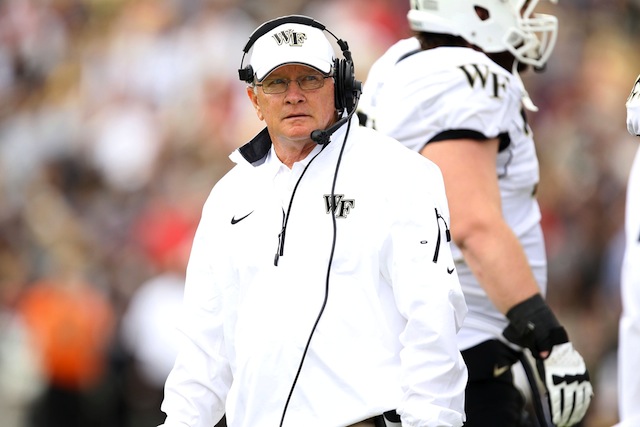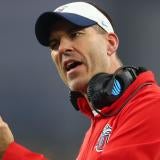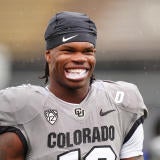
CBS Conference previews: ACC | Big Ten | Big 12 | SEC | Group of Five/Indep.
GREENSBORO, N.C. -- Jim Grobe looked out of place at ACC media days in July. He felt it, too. Less stress, less excitement.
He's an ACC television analyst this season, not a longtime Wake Forest coach who once improbably reached the Orange Bowl in a year that will forever be part of ACC lore.
Grobe, who resigned last December after the greatest 13-year run in Wake Forest history, is part of college football's next wave of possible comeback coaching attempts for 2015. He's in that in-between phase right now: Do you or don’t you try to get back into coaching?
Grobe also symbolizes the cautionary tale of what can happen to a coach who doesn't jump when his resume reaches its peak. Nebraska pursued Grobe in 2007 before hiring Bo Pelini. So did Arkansas in 2007, prior to landing Bobby Petrino. Grobe was mentioned in the 2008 Clemson search before Dabo Swinney got the job permanently.
Instead, Grobe cherished stability and in 2007 signed a 10-year contract with Wake Forest that paid him $2.3 million in 2013 (sixth-highest in the ACC and up from $988,000 in 2006, according to USA Today Sports). He won't coach the final three years of the deal and can't help but play the what-if game about his career.
When asked if he regrets not taking the Nebraska job, Grobe doesn't hesitate. "I do now, I didn't at the time," he said. "I honestly took great pride in Wake Forest. I had some really good friends there. I trusted some people there. I thought Wake was a little different than other schools. I really, at the time, felt we were going to get a bigger commitment in terms of facilities and support for the program that never really materialized. We loved all 13 years we were in Winston-Salem, but I’m not real happy with the way things ended."
To be fair, Grobe unequivocally accepts blame for Wake Forest going from three straight bowls between 2006-08 to 5-7 and 3-9 records in his final two years. Grobe blames himself for making recruiting mistakes by getting too caught up in signing more talented players who had off-the-field behavioral issues.
Wake Forest is unlike most schools. It has the smallest enrollment of any member of the five major conferences and far fewer football resources than most. When Wake Forest played in the Orange Bowl, Grobe was redshirting as many players as possible so the Demon Deacons could offset talent deficiencies by playing with men against more talented boys.
"We kind of got away from that dynamic and started recruiting a little bit better player who probably doesn't have a good enough love for the game," Grobe said. "Quite frankly, I ended up spending a lot of time last year with five knotheads who were always missing class, missing study hall, missing tutoring, late to meetings, late to practices, and ultimately I just wouldn't play them. They were very talented kids who could have helped us win games. There's no question I could have done a better job."
Through the years, Grobe’s offense also evolved. It started as a unique, misdirection offense filled with cut blocks that was difficult to prepare for and morphed into a more traditional pro-style offense. Four-year starting quarterback Riley Skinner triggered the transition, starting with the 2006 ACC championship season. He set an ACC record for completion percentage in 2007 and the school record for touchdowns in 2009.
"I hate to say that Riley Skinner hurt us, because he won more games than any quarterback in Wake Forest history, but we ended up in a pro-style offense that didn't really fit us expect for Skinner," Grobe said. "We were throwing the ball every snap. We lost all that misdirection stuff. We just got stuck."
Even at Wake Forest, the expectations became raised. Grobe inherited a program with five winning seasons in the previous 21 years and then produced five winning seasons in his first seven years.
"The expectations got too high without a push for better facilities and better support," Grobe said. "When your expectations go up but the things you're doing to win don't, that's when there's a problem."
New Wake Forest coach Dave Clawson reached out to Grobe before taking the job to discuss Wake Forest.
"Wake Forest is a much better football program and a much better job because Jim Grobe was there," Clawson said. "He has been nothing but gracious and helpful to me in my time there, and he doesn't have to be that way. We didn't have a prior relationship. ... It's big shoes to fill. You have a hard time finding someone in Winston-Salem who's not a Jim Grobe fan."
Here's the thing: At age 62, Grobe itches to still coach, not just be a nice guy. He said he was in the mix for the Army, UAB and Georgia Southern jobs after last season but feared taking a job and regretting the decision a couple months later.
At ACC media days, Grobe spoke with Duke coach David Cutcliffe, who took a year off due to health issues after he was fired by Ole Miss. Cutcliffe's advice to Grobe: Take a year to refocus and figure out if he wants to coach again.
Right now, Grobe's answer is yes. He expressed excitement to be an analyst for four ACC games this year, but talking about the game isn't the same as coaching the game.
"It's funny to be here talking football, but I don't feel that same electricity," Grobe said. "It's a good thing -- right now.”




















